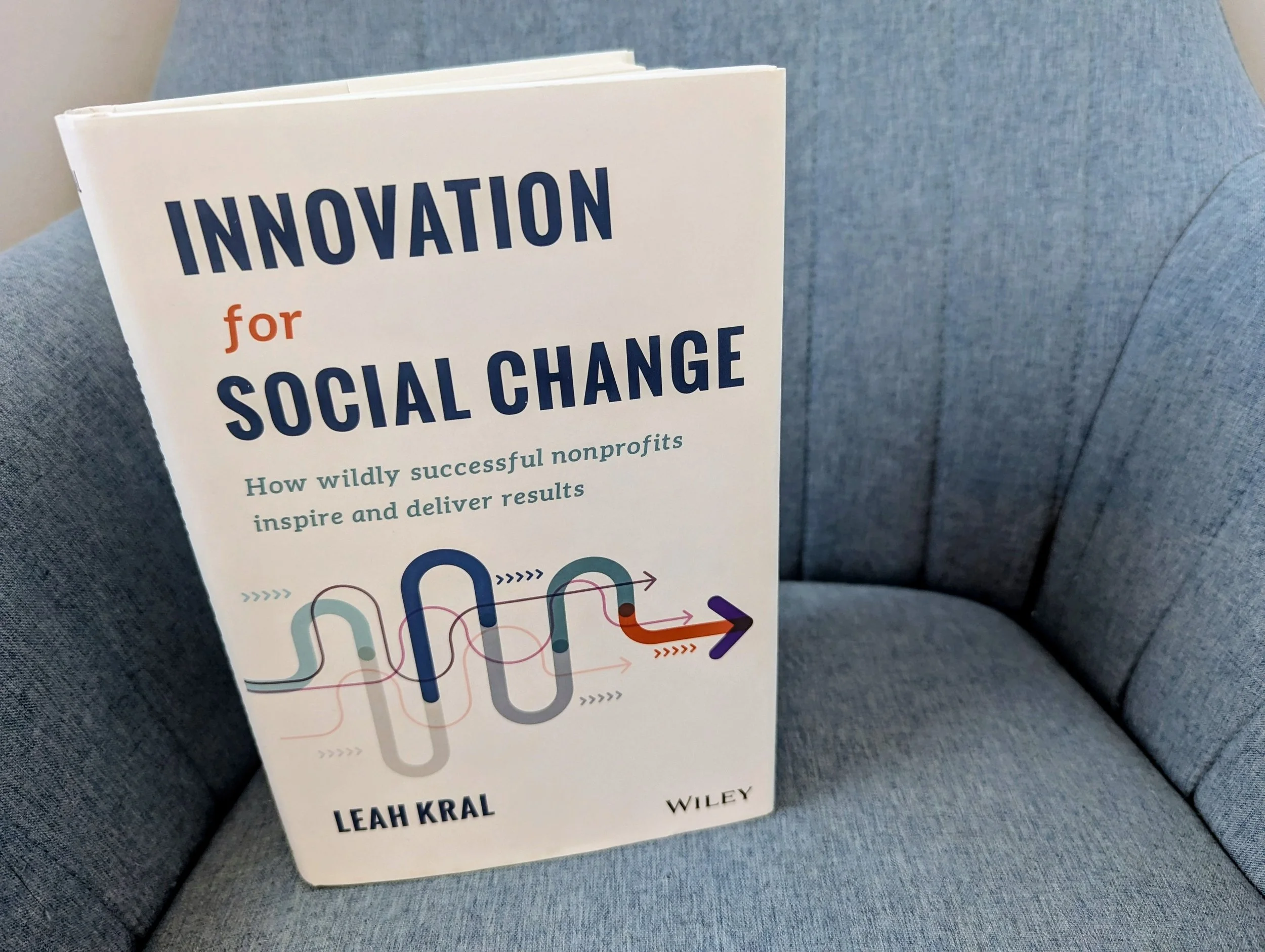NEWS
Insights for Change: Innovation is a collective undertaking
We hear often that we must innovate to survive, to progress, to succeed, but being told to innovate can be like being told to relax—easier said than done and incredibly frustrating to be told. That’s why I appreciate Leah Kral's book, Innovation for Social Change. Kral demystifies an intimidating concept, breaking it down into an accessible roadmap, including stories that ground it in reality and tools that make it actionable.
Insights for Change: The potential of spiritual innovation to revitalize faith and communities
In October, innoFaith co-hosted a conversation in Chicago on spiritual innovation and local spiritual ecosystems. This conversation emerged from a national Mapping Spiritual Innovation project that we've collaborated on over the past year with Chaplaincy Innovation Lab, Glean Network, Faith Matters Network, as well as a range of other supporters and advisors. The research and our conversations with spiritual innovators have pushed us to ask not only about the role of the innovators but also that of legacy religious institutions in the midst of this shifting landscape. We are inspired by the different ways people and institutions nurture spiritual and religious life and how, out of that commitment, they create positive social change. We see enormous potential for the revitalization of faith and spirituality, in both old and new ways, as well as the thriving of communities if we can nurture and connect the roles that these different actors play.
Insights for Change: Collaboration from the heart
A new report by CoCreative, The Human Heart of Systems Change, explores the challenges, needs, and opportunities in collaborative systems change work through interviews with twelve network leaders, field leaders, and funders. These conversations surfaced important insights about how the field can evolve to meet our current moment, including adopting a more human, love-based approach – a need that we believe illustrates why faith communities should see themselves as essential players in the work of systems change.
Insights for Change: Unleashing Our Spiritual Imagination
Faith & Philanthropy, an exploratory joint grantmaking initiative that aims to shape “a philanthropic landscape that embraces the transformative potential of spirituality and faith to address the pressing challenges of our time,” recently released a Spiritual Imagination report featuring twelve grantees rooted in various spiritual traditions that are leveraging faith and spirituality for social impact.
Insights for Change: Liberate leadership from the pyramid
Like every institution in the 21st century, religion today confronts existential questions about its future, uncertain of its place in an era where trust in institutions has eroded and traditional hierarchical organizational structures have started to flatten. The formerly reliable foundations of our religious life feel insecure–for no one more than clergy, who are largely trained to be solo, prophetic leaders of congregations. But in this uncertainty lies possibility. A new book by two religious leaders, Rev. Kathleen McShane and Rabbi Elan Babchuck, will help clergy, and all faith-rooted leaders, embrace the liberating opportunity this current moment provides. It’s time to adopt a new form of leadership, free of the burdens of pyramid-shaped empire that have shaped our past.
Insights for Change: Weaving networks
Houston, we have a problem. The complexity of the issues we face, both global and local, are simply too great for any one person or organization to take on alone. And yet, the systems in which we operate tend to incentivize heroic leadership, organizational competition for funding, and transaction over relationship. The good news? There's a different way if we shift our frameworks, incentives, and approaches: cultivating networks.
Insights for Change: Tapping our transformative potential
Last month, I attended a gathering of “spiritual changemakers.” Participants at this event, Soularize—co-hosted by Ashoka, The Presencing Institute, and Co-Creative—came from around the world and from all layers of spirituality and religiosity. They shared a common commitment to imagining a different world in which all people thrive, and to the role that spirituality plays in creating that world.
Insights for Change: "We have to evolve past random worthy efforts"
Ending homelessness is not a pie-in-the-sky aspiration for the organization Community Solutions. They are working to actually end it and have shown it’s possible. Fourteen counties across the U.S. have already reached “functional zero” homelessness—meaning it’s rare, quickly flagged when it happens, and quickly and sustainably resolved—using the Community Solutions methodology. In this Ashoka interview, founder Roseanne Haggerty talks about the approach and methodology.
Insights for Change: Our purpose matters more than our form
I had the pleasure of being part of Spencer Burke’s Next Sunday Summit last month. Check out my conversation with Spencer on how our purpose as faith communities matters more than our form and how we need to expand our horizons and imagination about our spiritual, community, and change power.
Insights for Change: Center the margin
A Way Out of No Way pushes us to interrogate the forces and narratives that shape our own thinking. It makes us ask whether and how our innovation will perpetuate or transform the dynamics that exile people to the margins of society. Doing so will undoubtedly make all of us more effective change makers.
Insights for Change: Creative courage to build for an envisioned future
On a recent call, a friend of mine in Poland shared his take that the innovation of the underground Solidarity movement in 1980s Poland was that it basically ignored the tanks on the streets that threatened political repression. While the tanks rolled, the people went about building their own underground civil society, which then became the foundation for democratization. Surely they couldn’t actually ignore the threat, and Solidarity continued to organize protests against the government even after they went underground. But I think he meant that they did not let the tanks steal their focus. They didn't just act against something, they built something new. Underground, they built the structures for a democratic society.
Insights for Change: From service to solutions
As faith communities, we engage in so many essential social service efforts in our communities. It is sacred work to be present to people marginalized by the systems of our societies. It is also sacred work to change those systems. As we serve, we have the opportunity to learn, collect data, spot patterns that can help point to systemic solutions.
Insights for Change: Success metrics for faith communities in a changing world
In April, we hosted a conversation with Henry De Sio, Stephen Lewis, and Rabbi Elan Babchuck about how people and communities of faith can lead in a world of explosive change. One thread that emerged in the conversation was the question of how faith institutions think about success in a changing world. As Elan explained, “The old way has an old set of KPIs [Key Performance Indicators]: budgets, butts [in seats], and and buildings. This puts us in the entertainment industry, not the transformation industry.” So let’s start imagining a different framework, one that helps us position our leadership to bring transformation to an increasingly complex world. What would that look like?
"How do we keep a people as old as Moses innovating?" Insights for institutional religion from a gathering of spiritual innovators
Last month, I had the opportunity to attend a gathering of the Kenissa network, a group founded by Rabbi Sid Schwarz, that brings together leaders who are re-imagining Jewish life and fostering "communities of meaning." Kenissa supports and connects these leaders to help their efforts and emerging communities to thrive. The gathering was representative of a growing movement of faith-based innovators operating outside the bounds of traditional religious institutions and a model of three characteristics I believe our religious institutions must learn to adopt if they are to flourish in the current era and into the future.














